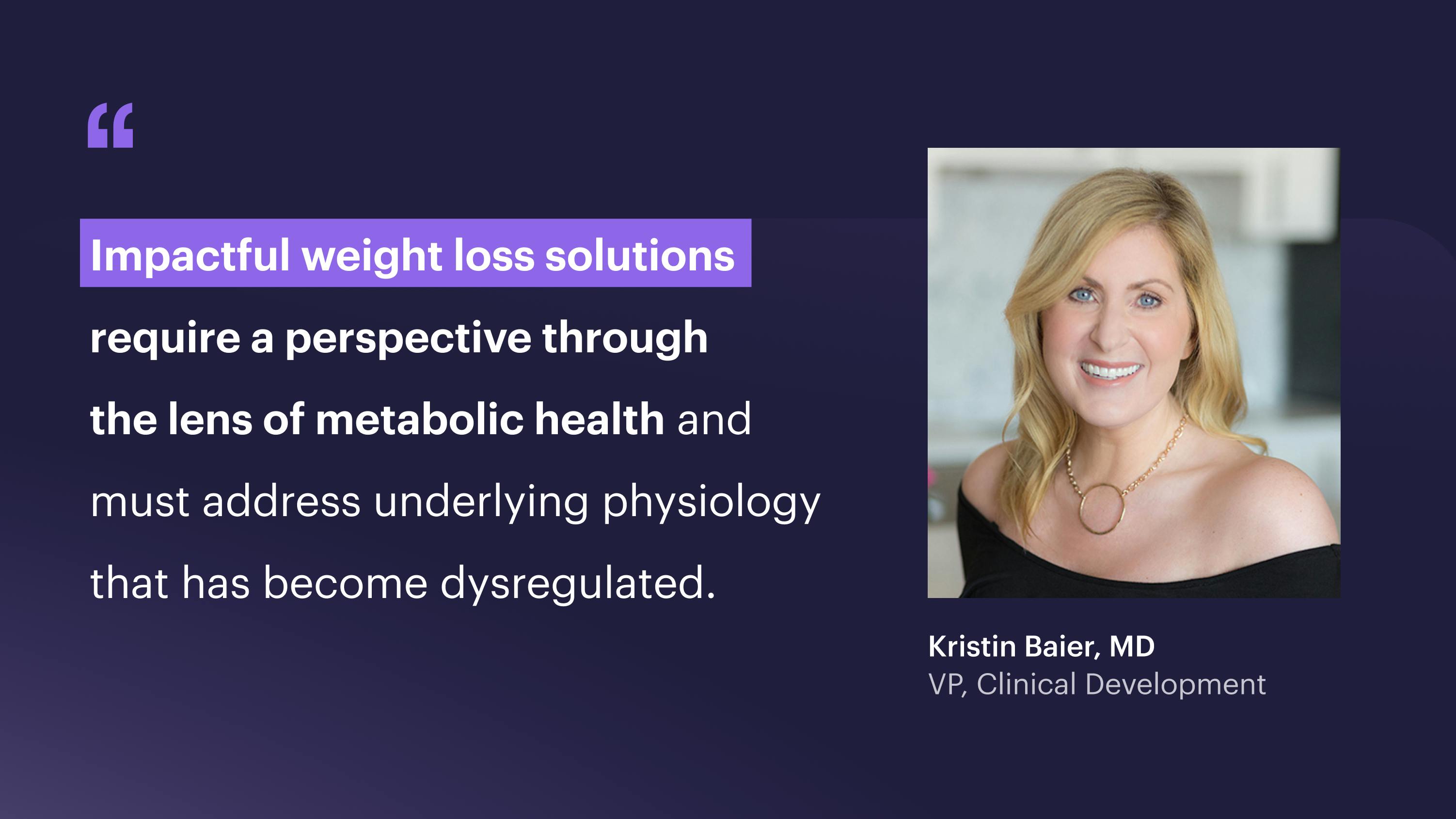Transforming Obesity Management
A Data-Driven Journey with Calibrate by Dr. Kristin Baier, VP Clinical Development
Article published on February 27, 2024
Being a complex chronic disease inflicting roughly two-thirds of America’s population, treatment for overweight and obesity demands an unbiased and accessible approach that leverages pharmaceutical interventions with implementable, personalized lifestyle interventions for sustainable results. Calibrate’s real-world data reflects how an outcomes-driven, comprehensive program can change the way the world treats weight while containing near-term costs for payors.
Impactful weight loss solutions require a perspective through the lens of metabolic health and must address underlying physiology that has become dysregulated. Our non-weight related data reflects Calibrate does in fact help members reach incredible metabolic health improvements including better glycemic control and a reduction of inflammatory markers, waist circumference, triglycerides, and LDL cholesterol. Furthermore, 84% (n = 587) of members who began Calibrate with diabetes or prediabetes showed categorical improvement in their condition over the course of the program. This means members with type 2 diabetes improved to prediabetic glucose levels and members with prediabetes achieved normal glucose control. For perspective, the total estimated cost of care for diagnosed diabetes in the U.S. in 2022 was $412.9 billion; $306.6 billion direct and $106.3 billion indirect (Parker et al 2024). We have to recognize the astounding impact a combination of anti-obesity medications, accountability coaching, and lifestyle interventions, through the Calibrate program, will have on our healthcare system and provide a return on investment for payors. Monthly GLP costs are eye-catching, but the long-term cost of not finding solutions is even higher.
As a comprehensive approach to weight loss and metabolic health, Calibrate views GLP-1 medications as a tool, not the entire treatment. Amid challenges with nationwide medication shortages and fluctuating insurance coverage, our members averaged 8 months of GLP medication during their Calibrate program, and ~50% experienced medication disruptions due to these uncontrollable challenges. Despite medication access barriers, Calibrate members averaged 16.2% weight loss at 12 months and even continued to lose more weight with an average of 17.9% by 24 months in the program. Without a comprehensive program in place, patients are likely to regain weight after GLP medication is discontinued as demonstrated in clinical trials funded by the pharmaceutical industry. Our data suggests there is a path forward in using GLPs for the right patients, at the right time and for the right duration while containing costs.

A decreasing number on the scale is a commendable achievement but what does that mean for our members? With every 5% increment of weight loss, we start to see clinical improvement. Glucose control improves which means more energy stability, fewer finger pricks, and a reduction or elimination of medication. Blood pressure and lipid levels improve, alleviating anxiety around the risk of subsequent heart disease. At 15% we see really meaningful improvement in conditions such as sleep apnea that can eliminate the need for a CPAP and lead to higher energy and productivity the next day. Depression improves. Mobility improves. Relationships improve. Confidence and self-esteem improve. Patients reclaim their lives.
Any conversation around weight loss would be remiss if lifestyle components and real-world application was omitted. Our structured curriculum and accountability coaching supports progress against incremental goals and intensive behavior change across the Calibrate pillars: food, sleep, exercise, and emotional health. This approach is clinically designed to promote sustained metabolic health success after medication and whole body health by addressing metabolic health, not just weight.
As we embark on this exciting new era of obesity management, obstacles around affordability and accessibility persist. Calibrate’s 2024 results report provides a solution for underserved patients with overweight and obesity to receive unbiased care and for payors to contain costs without bankrupting the healthcare system.